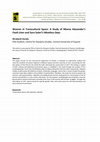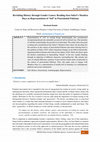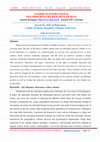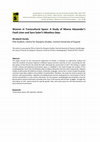Papers by Dr. Shrabanti Kundu

Conceptualised at the conference organised in January 2020 titled “Contextualising Migration: Per... more Conceptualised at the conference organised in January 2020 titled “Contextualising Migration: Perspectives from Literature, Culture and Translation” by the School of Humanities and Social Sciences at GITAM, Hyderabad in collaboration with CIIL, the present volume aims to engage the emergent tendencies within the long histories of migration motivated by a renewed understanding of translated ideas and identities in the present order of world affairs. The volume also aims to trace the literary metamorphosis under the influence of the emerging transnational, transmedial world of literary exchange that has documented the complex negotiation of loss and recovery and methods of searching for one’s identity on one hand and on the other, made literature increasingly difficult to be tied down to one nation, one language. Consequently, the volume is divided into three interconnected sections. The first two sections are dedicated to account for the challenges thrown by the latest discourse and ...

This paper focuses on the transcultural experience of women. It attempts to understand, analyse a... more This paper focuses on the transcultural experience of women. It attempts to understand, analyse and trace the condition of woman migrants in different spaces and their assertion of such, accounting not only that phase of their life but the whole life itself. Narrating the construction of self in life writing, in regard of both utilising and despising transcultural space, is modelled in the study through the analysis of two autobiographies, <em>Fault Lines</em> and <em>Meatless Days</em> by Meena Alexander and Sara Suleri respectively. Diaspora studies usually locate the dilemma of place, citizenship, language, culture but in recent studies the gender constrains have been added to this problem of positionality. Therefore, the study has tried to present the woman's self-representation, migration and displacement and the development or construction of self of women and identity in a new country. Moreover, for this purpose, autobiography has provided a concre...

International Journal of English Literature and Social Sciences
The spreading of familial ties across the globe has highlighted a range of questions about the fa... more The spreading of familial ties across the globe has highlighted a range of questions about the family structure and the impact of migration especially on older people. Their involuntarily movement leaves many a consequences as they find it pretty much difficult to cope with the socio-cultural changes one has to undergo. In this sudden change of practice, with ever new essence of land and people, they feel uncomfortable and, in a way, get disrupted with their belief system. Sometimes, it comes with the price of sacrificing their homely happiness into this late years of life before an illusionary vision of paradise on the other side of the sea. The dichotomy for the aged people lies into the caregiving notion of East and the West&#39;s respective familial ties. While one is a collective society where people live into the large family bondage, the other is individualistic in its outlook taking care of their own themselves. The dialectics of home and migration of elderly people creates a complex meaning of family and familiarity. This happens as being with family they lack their familiar space. A selection of Rishi Reddy&#39;s two short stories from the collection &quot;Karma and Other Stories&quot; bring us the life of two migrants into the opportunities of the West in their late age and get perennially mixed up into the new world order.

IJMAR, 2018
Representation of ‘self’ in writing brings autobiography into consideration incorporating the pri... more Representation of ‘self’ in writing brings autobiography into consideration incorporating the private and public account of self in a stylised way. The narration of self thus acknowledges the growth of an individual. This study refers this point in taking into consideration Sara Suleri’s Meatless Days where she develops her life narrative in the context of postcolonial Pakistan and often referring back to the partition of India (1947) where situational changes occur both in the historically important political domain and in the private sphere of life. Suleri also draws upon the distinct connotations in representing ‘female’ in her text, usually thinking through its depiction of different characters surrounding her. She narrates her story of cultural difference, the memory of the past and her female mates in particular in the context of postcolonial Pakistan. Thus, this paper aims to engage with Meatless Days as a representation of female-self in situating it in contemporary political and social connotations.

SANSKRUTI INTERNATIONAL MULTIDISCIPLINARY RESEARCH JOURNAL , 2018
Dispersion from homeland leave behind a handful of memory, with it one has to survive in a foreig... more Dispersion from homeland leave behind a handful of memory, with it one has to survive in a foreign land. The flow of life finds a sudden change when an individual migrates, whether it is a forced migration or a volunteer act. Autobiography of a person who experienced two or more
cultures, lands, customs, traditions, languages and lifestyles of countries, contains a unique exposure of both the homeland and host land. Thus, the duality they experience also get revealed in their narratives. Therefore, this paper concentrates on the effect of multiple migration and the consequence of cultural amalgamation in a woman’s life. Even her narration in an onscious or an unconscious way makes a comparison between the home and other. These elements of home and host, and her struggle for her identity in a new landmark an important element in the text. This discussion about the text formulates a basic understanding of the migrant woman’s problematic position as well as writing this subjective account enables her to accumulate her own identity in a foreign land.

Postscriptum: An Interdisciplinary Journal of Literary Studies, 2019
This paper focuses on the transcultural experience of women. It attempts to understand, analyse a... more This paper focuses on the transcultural experience of women. It attempts to understand, analyse and trace the condition of woman migrants in different spaces and their assertion of such, accounting not only that phase of their life but the whole life itself. Narrating the construction of self in life writing, in regard of both utilising and despising transcultural space, is modelled in the study through the analysis of two autobiographies, Fault Lines and Meatless Days by Meena Alexander and Sara Suleri respectively. Diaspora studies usually locate the dilemma of place, citizenship, language, culture but in recent studies the gender constrains have been added to this problem of positionality. Therefore, the study has tried to present the woman's self-representation, migration and displacement and the development or construction of self of women and identity in a new country. Moreover, for this purpose, autobiography has provided a concrete ground where women themselves articulate their story or life journey with all their struggles. Through this articulation of 'self', women break the specific gender roles, and create space for self-representation and deny all kinds of restrictions.











Uploads
Papers by Dr. Shrabanti Kundu
cultures, lands, customs, traditions, languages and lifestyles of countries, contains a unique exposure of both the homeland and host land. Thus, the duality they experience also get revealed in their narratives. Therefore, this paper concentrates on the effect of multiple migration and the consequence of cultural amalgamation in a woman’s life. Even her narration in an onscious or an unconscious way makes a comparison between the home and other. These elements of home and host, and her struggle for her identity in a new landmark an important element in the text. This discussion about the text formulates a basic understanding of the migrant woman’s problematic position as well as writing this subjective account enables her to accumulate her own identity in a foreign land.
cultures, lands, customs, traditions, languages and lifestyles of countries, contains a unique exposure of both the homeland and host land. Thus, the duality they experience also get revealed in their narratives. Therefore, this paper concentrates on the effect of multiple migration and the consequence of cultural amalgamation in a woman’s life. Even her narration in an onscious or an unconscious way makes a comparison between the home and other. These elements of home and host, and her struggle for her identity in a new landmark an important element in the text. This discussion about the text formulates a basic understanding of the migrant woman’s problematic position as well as writing this subjective account enables her to accumulate her own identity in a foreign land.